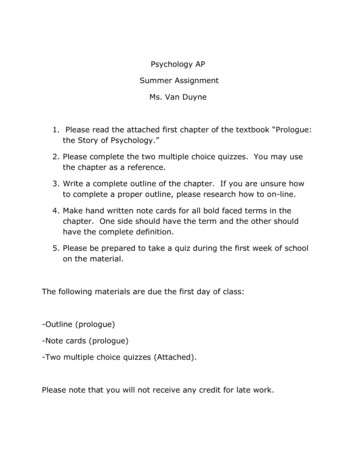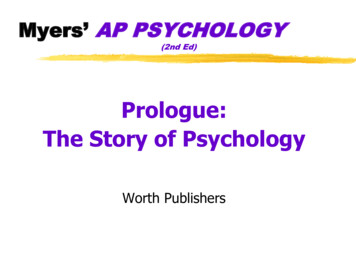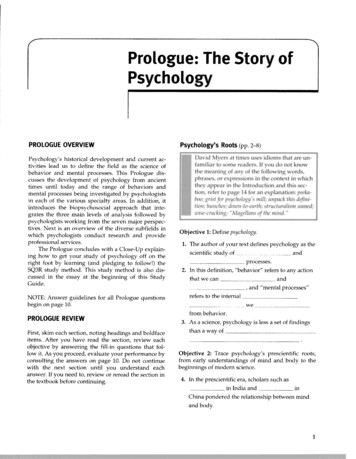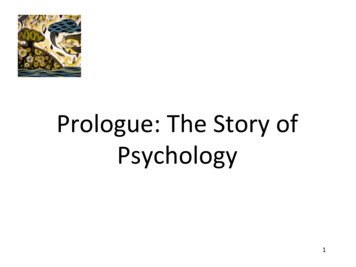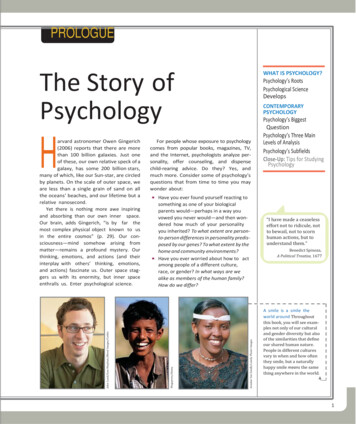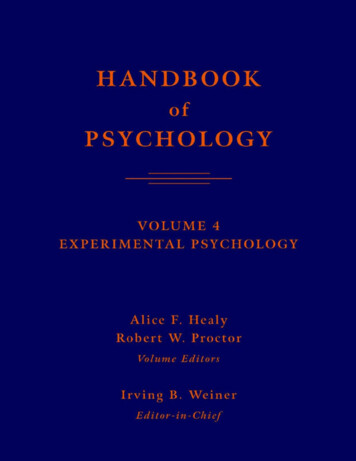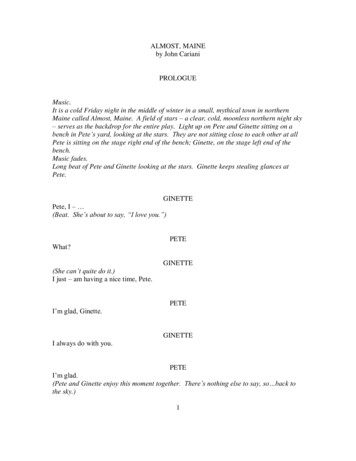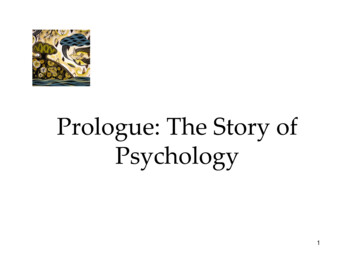
Transcription
Prologue: The Story ofPsychology1
Psychology’s RootsPrescientific Psychologywww.bodydharma.org/photo/buddha.jpgIn India, Buddha wondered how sensations andperceptions combined to form ideas.2
Prescientific PsychologyConfucius (551‐479 .jpgIn China, Confucius stressed the power of ideasand the importance of an educated mind.3
Prescientific PsychologyHebrew e.jpgHebrew scriptures linked mind and emotion to thebody.4
Prescientific aw.umkc.eduSocratesSocrates (469‐399 B.C.) and Plato (428‐348 B.C.)Socrates and his student Plato believed the mindwas separate from the body, the mind continued toexist after death, and ideas were innate.5
Prescientific PsychologyAristotle (384‐322 B.C.)http://faculty.washington.eduAristotle suggested that the soul is not separablefrom the body and that knowledge (ideas) growfrom experience.6
Prescientific PsychologyRene Descartes .comDescartes, like Plato, believed in soul (mind)‐bodyseparation, but wondered how the immaterialmind and physical body communicated.7
Prescientific PsychologyFrancis Bacon (1561‐1626)http://www.iep.utm.eduBacon is one of the founders of modern science,particularly the experimental method.8
Prescientific PsychologyJohn Locke (1632‐1704)biografieonline.it/img/bio/John Locke.jpgLocke held that the mind was a tabula rasa, orblank sheet, at birth, and experiences wrote on it.9
Psychological Science is BornStructuralismTitchner (1867‐1927)Wundt (1832‐1920)Wundt and Titchener studied the elements (atoms)of the mind by conducting experiments at Leipzig,10Germany, in 1879.
Psychological Science is BornFunctionalismMary CalkinsJames (1842‐1910)Influenced by Darwin, William James establishedthe school of functionalism, which opposed11structuralism.
Psychological Science is BornThe Unconscious MindFreud (1856‐1939)Sigmund Freud and his followers emphasized theimportance of the unconscious mind and its effects12on human behavior.
Psychological Science DevelopsBehaviorismSkinner (1904‐1990)Watson (1878‐1958)Watson (1913) and later Skinner emphasized thestudy of overt behavior as the subject matter of13scientific psychology.
Psychological Science DevelopsRogers yweb.cortland.eduMaslow (1908‐1970)Humanistic PsychologyMaslow and Rogers emphasized currentenvironmental influences on our growth potential14and our need for love and acceptance.
Psychology TodayWe define psychology today as the scientificstudy of behavior and mental processes.15
The Big DebateNature versus NurtureDarwin (1809‐1882)Darwin stated that nature selects those that bestenable the organism to survive and reproduce in a16particular environment.
Psychology’s Three Main Levels ofAnalysis17
Psychology’s Current PerspectivesPerspectiveFocusSample QuestionsNeuroscienceHow the body and brainenables emotions?How are messagestransmitted in the body? Howis blood chemistry linked withmoods and motives?EvolutionaryHow the natural selectionof traits the promotes theperpetuation of one’sgenes?How does evolution influencebehavior tendencies?Behavior genetics How much our genes andour environmentsinfluence our individualdifferences?To what extent arepsychological traits such asintelligence, personality,sexual orientation, andvulnerability to depressionattributable to our genes? Toour environment?18
Psychology’s Current PerspectivesPerspectiveFocusSample QuestionsPsychodynamicHow behavior springsfrom unconscious drivesand conflicts?How can someone’spersonality traits anddisorders be explained interms of sexual andaggressive drives or asdisguised effects of unfulfilledwishes and childhoodtraumas?BehavioralHow we learn observableresponses?How do we learn to fearparticular objects orsituations? What is the mosteffective way to alter ourbehavior, say to lose weight orquit smoking?19
Psychology’s Current PerspectivesPerspectiveFocusSample QuestionsCognitiveHow we encode, process,store and retrieveinformation?How do we use informationin remembering? Reasoning?Problem solving?Social‐culturalHow behavior andthinking vary acrosssituations and cultures?How are we — as Africans,Asians, Australians or NorthAmericans – alike as membersof human family? As productsof different environmentalcontexts, how do we differ?20
Psychology’s Subfields: vePersonalitySocialWhat she doesExplore the links between brain andmind.Study changing abilities from womb totomb.Study how we perceive, think, and solveproblems.Investigate our persistent traits.Explore how we view and affect oneanother.21
Prescientific Psychology Socrates (469‐399 B.C.) and Plato (428‐348 B.C.) Socrates and his student Plato believed the mind was separate from the body, the mind continued to exist after death, and
